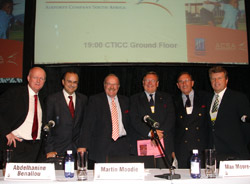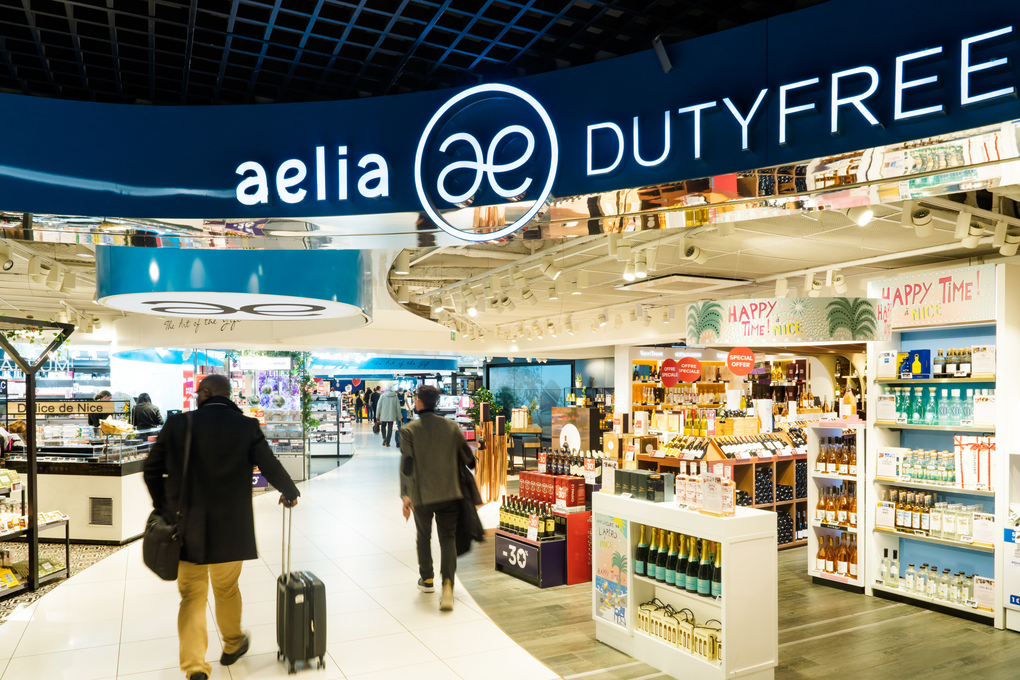 |
Pictured left to right in Cape Town yesterday: Martin Moodie with Office National des Aéroports (Morocco) Director General Abdelhanine Benallou; Gunnar Heinemann and Harry Diehl of Gebr Heinemann; Sydney Airport Corporation Chairman Max Moore-Wilton; and Global Brands Group (Australasia) Managing Director John Moore |
SOUTH AFRICA. Gebr Heinemann Co-Owner Gunnar Heinemann yesterday described the impact of new EU aviation security regulations on duty free as the “biggest threat ever” to the travel retail channel.
Addressing delegates at the ACI 2006 World Annual General Assembly in Cape Town, Heinemann said that travel retail had proved its innate resilience in overcoming many previous threats such as SARS, 9/11, war and terrorism. “It is a very robust business,” he said. “But when we start confiscating duty free products it’s going too far.
“We are removing the fun of airport shopping,” he added. “The whole credibility of our business is at stake.”
The reference to confiscations follows the implementation of new aviation security regulations within EU/EEA and Swiss airports on 6 November. As a result of the changes, passengers entering EU/EEA/Swiss airports from outside those countries and then transiting onwards, will have liquid/gel/paste items of over 100ml in volume confiscated at the transit security point, a particularly serious development for the liquor sector.
Gunnar Heinemann was part of a strong panel line-up (pictured above) in a session entitled “˜Airports mean Revenues’ during yesterday’s proceedings. He was joined by Sydney Airport Corporation Chairman Max Moore-Wilton, Office National des Aéroports (Morocco) Director General Abdelhanine Benallou and Global Brands Group (Australasia) Managing Director John Moore (the former CEO of The Nuance Group Asia Pacific).
Security was a pervading theme during the question and answer session that followed the formal presentations. The Moodie Report Publisher Martin Moodie led the session, beginning with a round-up of the new regulations and their impact on airports represented in the audience.
He said: “I believe if the transit issue is not dealt with quickly and effectively, both the short term and long term damage to airport commercial revenues will be considerable. More importantly, devastating perhaps irreparable damage will be done to the image of airport duty free and travel retail. We risk changing our airports from fun, integral elements of the travel experience into an Orwellian bureaucratic nightmare.”
He continued: “In case any of you in this room are in any doubt, the November 6 regulations mean that any of your passengers who arrive in an EU/EEA or Swiss airport as of Monday this week, who are carrying liquid items of over 100ml in their hand luggage and who then transit onwards, will have those items confiscated at the transit security point. No ifs. No buts. No maybes.
“If you’re buying any lovely South African wine here and heading home to, say, Copenhagen via Frankfurt, it will be confiscated. A European solution has been struck but effectively many of the countries that were considered immune to the August 10 threat are now more caught up in its aftermath than the countries that were at the heart of the alert.
“I’m sorry Ladies and Gentleman but those of you outside the EU/EEA and Switzerland cannot, must not, sell to passengers bound for the EU and then transiting. It is you, not they, who will be paying the cost for years to come.”
Moore-Wilton praised ACI for passing a resolution (see below for full text) earlier this week calling for a new multilateral regulatory framework by 31 March 2007. This would harmonise the restrictions on the carriage of liquids, gels, aerosols and duty free items in hand baggage; and establish protocols to facilitate passengers transferring through airports with duty free items that were purchased under the appropriate security controls at the airport of origin.
“We cannot continue to treat international travellers as if they are terrorists,” he said to loud applause. That message was echoed from the floor by Gebr Heinemann Chairman of the Advisory Board Harry Diehl who said that more selective screening of passengers was vital – “it’s a big mistake to screen hundreds of millions of people,” he commented.
Priority must be given to ensuring that government-driven security considerations do not weaken business viability, Moore-Wilton said, adding “A global solution must be found very quickly.”
He added: “The industry has proven it is robust and flexible and the traveller is forgiving, up to a point. But if we get to the point where the traveller says “˜I’m mad as hell and I’m not going to take it anymore’ then things will change. But maybe we need to get to that point [for the politicians to listen].”
Gunnar Heinemann added: “We’re headed towards the point where we need to put the politicians not only in the queues at airports but at the end of the queues so that they can understand what our passengers put up with.”
Benallou joined the call for action, saying “It is critical that we each contact our governments. None of us were consulted.”
THE ACI RESOLUTIONS
ACI calls upon governments, after consultation with airports, airlines and industry stakeholders, to establish urgently – at the latest by 31 March 2007 – through the International Civil Aviation Organisation (ICAO), a new multilateral regulatory framework which facilitates efficient passenger movement through the air transport system by:
a) Harmonising the restrictions on the carriage of liquids, gels, aerosols and duty free items in hand baggage; and
b) Establishing protocols to facilitate passengers transferring through airports with duty free items that were purchased under the appropriate security controls at the airport of origin.
A second, related resolution stated: ACI calls upon industry stakeholders to work with it and member airports:
a) To address the short and long term implications of these additional preventive security measures on airport facilities, systems, operational processes and passenger service levels; and
b) To restore the balance between the requirements of aviation security and the needs of facilitation.
MORE STORIES ON THE NEW SECURITY RULES
ACI World calls for harmonised global duty free regulations by 31 March 2007 – 07/11/06
Hold the Front Page; how the daily media covered the November 6 changes – 07/11/06
Aviation security top of agenda as annual ACI World Assembly begins in Cape Town – 06/11/06
November 6: a critical day for the global travel retail industry – 06/11/06
Cyprus Airports puts customer communication first as new EU security regime takes impact – 05/11/06





